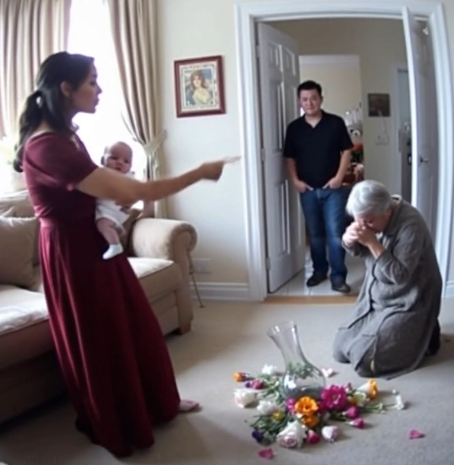 My son, Samuel, and his wife, Everly, had been living in our house for eight years. Martha and I believed we were helping them start their lives, supporting them as best as we could. But the incident that unfolded on the morning after our grandson was born shattered that notion completely.
My son, Samuel, and his wife, Everly, had been living in our house for eight years. Martha and I believed we were helping them start their lives, supporting them as best as we could. But the incident that unfolded on the morning after our grandson was born shattered that notion completely.
That bright morning, Martha was in the kitchen, humming softly while arranging flowers she’d picked from the garden. At seventy-three, she still found happiness in the simple things that life had to offer. Suddenly, the baby’s cries pierced the air, soon followed by Everly’s sharp voice from the living room, demanding that Martha keep it down so the baby could rest.
Martha, ever the caring soul, moved gently toward the living room. Her excitement at becoming a grandmother was a joy she’d been anticipating for months. But then, I heard a dull thud, followed by Martha’s surprised gasp, and the unmistakable sound of the vase shattering against the floor.
I rushed in. The scene before me was chilling. My wife lay on the ground, her expression a mix of pain and humiliation, flowers strewn around her. Everly stood over her, clutching our grandson, her face a mask of disdain. “Don’t you dare touch him!” she yelled, even though Martha hadn’t even reached for the baby. “You’re unclean! Look at this mess. You think I’m going to let filthy hands anywhere near my son?”
Unclean. The word hung heavily in the air, a cruel label marking my wife in her own home. Silence engulfed the room, broken only by Martha’s soft, stifled sobs, not from physical hurt but from the deep emotional wound Everly’s words had inflicted.
Samuel appeared in the doorway, his face a mix of discomfort and muted shock. “Dad, Everly’s just protective of the baby,” he mumbled, his voice lacking conviction. Protective. That was the feeble justification my son offered for what I’d just witnessed.
Everly, unyielding, added, “Actually, Samuel and I were discussing how it might be better if Martha stayed in her bedroom when the baby’s in the main areas. For hygiene reasons. You understand.”
Hygiene reasons. This was not just an isolated incident; it was a culmination of eight years of my wife slowly being pushed aside, her presence and contributions diminishing in her own home, while I stood by, oblivious to the gradual erosion of her dignity.
That night, lying beside Martha as she silently wept, I made a decision. The following morning, I called Samuel over and, with a steady voice, uttered three words. “You must leave.”
The shock on their faces was palpable. They had never anticipated such a response, never thought the quiet, accommodating parents would draw a line. But the well-being of my wife, the respect she deserved in her own home, took precedence over everything else.
As they packed their things, the reality set in. It was time for them to find their own space, to build their lives independently, while Martha and I reclaimed our sanctuary. The decision was difficult, but it was necessary to restore balance and respect within the walls of our home. In the end, it wasn’t just about Everly’s words or Samuel’s silence; it was about standing up for what is right, about affirming love and dignity for the woman who had given everything to her family.